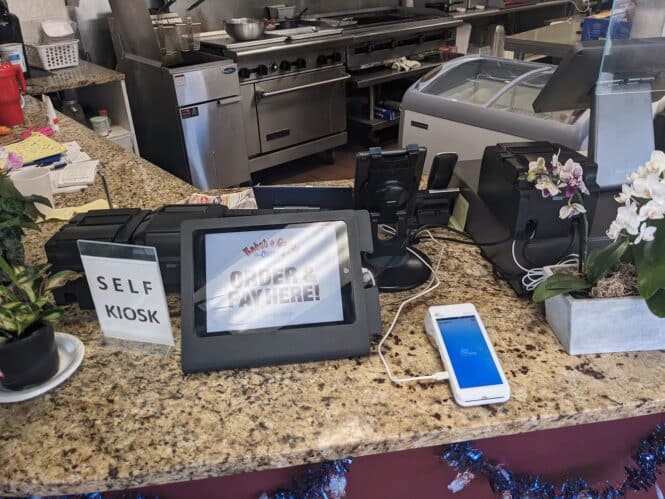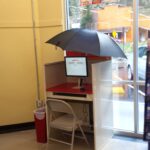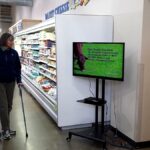
Off The Shelf Computers as Public Facing aka Ad Hoc Kiosks

We’ve been running into what we call ad-hoc or ala carte use of computers in an attempt to provide self-service to customers. Providing self-service is a terrific goal, customers deserve multiple channels to do their business. It can be Point-Of-Sale, Telehealth or any form of check-in/check-out. Some verticals like healthcare have considerations over and above POS.
We’ve got images of POS situations using discrete components and calling it self-service. There are many disadvantages and almost no advantages (if you exclude lowest upfront cost and time factor). Easy to go to Amazon and find something, or catch a sale at Dell or HP.
We will start with the computer terminal on countertop
Advantages
-
- You can get one very cheap
- Speed of delivery is overnight if you like
Disadvantages
-
- The vendor rarely has any experience with self-service
- Customer has to wonder if it’s a kiosk or some part of in-house POS
- New standards can invalidate your solution. We work with U.S. Access Board and new standards for kiosks are coming out in December.
- Usually easy to walk off with
- Consumer grade touchscreen
- Consumer grade computer
- Consumer grade O/S
- Medium and longterm cost is higher
- Liability is higher (check with legal department)
- Generally a shorter lifecycle than what they tell you
- Adding devices is problematic at best
- Privacy and data issues (via hacking or physical theft)
- Privacy screens usually not provided
- Healthcare iterations have stringent ADA requirements. Adding an Storm Audiopad “adhoc” does not necessarily mean ADA compliance.
- If so typically it’s an add on/clipon which quickly gets picked on and looks pretty bad
- Added devices are usually hard to find or get moved and then are hard to find
- Added devices are much easier to walk off with
- Added devices are referred to as “warts” because that is what they are
- Some devices are not designed for use in adhoc position (Audiopad would be one for example)
- Is it ADA — I doubt Amazon or Dell will advise you of ADA or ABA requirements
- You usually do your own branding sign if you are intent on really going cheap (see picture)
- The one on the right is dangerously close to being in violation of PCI regs
- Ad hoc computers generally are easier to hack and steal information (publicly accessible ports biggest problem)
- Cable management issues
- Maintenance issues down the road
- Multiple service points and contacts
- Extended warranties are rare
- User experience – projecting a “we went cheap” with ad-hoc solution doesn’t inspire confidence
Now For A Kiosk
Advantages
- The vendor has likely 30 years of experience in self-service
- Purpose-built and purpose designed with experience
- Experienced vendors know what is coming with new standards (U.S. Access Board upcoming)
- Its appearance communicates your experience in positive manner
- All the components are secure
- Commercial grade touchscreen
- Commercial grade computer
- Commercial grade OS
- You can add components easily
- You have one stop for support
- Liability is lower (check with legal department)
- Sometimes software applications will have “qualified” self-service iterations that they will support (e.g. Epic)
- Privacy and data issues are mitigated to a very large extent
- No cable management
- Maintenance and service is generally one-stop
- Extended warranties are usually available for up to five years
Disadvantages
- Probably have to wait 6 weeks
- Initially, the upfront cost is higher
Pictures
We keep a gallery of image for “Not The Best Idea” up on Pinterest
Here are a couple of samples
- A small red desk with a white chair is neatly arranged in the corner by a window, resembling a true kiosk. On the desk, an OTS Computers monitor and black keyboard stand ready for use, sheltered by an umbrella above, with a trash can strategically placed on the floor beside it.
- A true kiosk experience, this payment machine features a screen with clear instructions and arrows showing where to insert coins, bills, and credit cards. Users are guided to press the gray box on the screen to begin. An Exit Ticket reminder is prominently placed at the top for convenience.
- A person with a walker examines an OTS Computer displaying dairy quality standards in a grocery aisle lined with refrigerated goods. True kiosk signs about food quality adorn the walls, while a wooden pillar stands close by.



